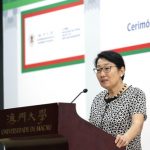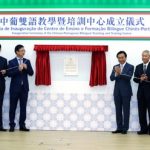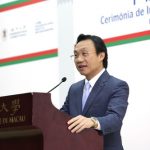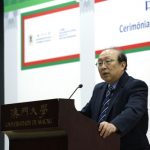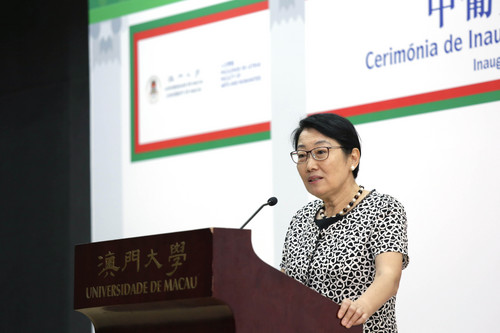 Hong Gang Jin explains the centre’s educational objectives
Hong Gang Jin explains the centre’s educational objectives
The University of Macau (UM) today (26 May) held an inauguration ceremony for the Chinese-Portuguese Bilingual Teaching and Training Centre. Secretary for Social Affairs and Culture Tam Chon Weng said that higher education institutions in Macao have better conditions than any university in mainland China to offer Portuguese language education. He expressed hope that faculty members of UM will work together at the Chinese-Portuguese Bilingual Teaching and Training Centre in order to nurture high-calibre bilingual professionals for Macao and China.
Officiating guests at the ceremony included Tam Chon Weng, secretary for social affairs and culture; Pu Hailong, deputy director of the Department of Education and Culture of the Liaison Office of the Central People's Government in Macao; Yang Shijun, director of the Office of Commissioner of the Ministry of Foreign Affairs of PRC in Macao; Wu Zhiliang, president of the Board of Directors of the Macao Foundation; Sou Chio Fai, director of the Tertiary Education Services Office; Leong Lai, director of the Education and Youth Affairs Bureau;Lam Kam Seng, chair of the UM University Council; and Wei Zhao, rector of UM.
In his speech, Tam said that he felt very happy to see that UM has established two centres, namely the Centre for Chinese History and Culture, and the Chinese-Portuguese Bilingual Teaching and Training Centre, in such a short period of time. He has high expectations for the two centres and hopes that they will help Macao accomplish the tasks given by China. Tam pointed out that from a historical perspective, Macao has many advantages and its culture has a very close relationship with China and Portugal, adding that there are many Portuguese expatriates and Portuguese-speaking professionals in Macao, including architects, medical professionals, media professionals, and teachers. He added that universities in mainland China do not have this advantage and for this reason higher education institutions in Macao have better conditions than any university in mainland China to offer Portuguese language education. Therefore, Tam hopes that UM faculty members will work together at the Chinese-Portuguese Bilingual Teaching and Training Centre in order to nurture high-calibre bilingual professionals for Macao and China.
In his speech, Wei Zhao pointed out that as the largest Portuguese teaching institution in Asia, the Department of Portuguese boasts a culturally diverse faculty team whose members include professors from renowned universities in Portuguese-speaking countries such as Portugal and Brazil, experienced educators fluent in both Chinese and Portuguese, and well-known scholars whose research interests include learning or teaching Portuguese as a second language. With the support of a strong faculty team, the centre will initiate various projects. First, the centre will use innovative methods to improve the Department of Portuguese’s current teaching mechanism and carry out targeted academic research in Portuguese language teaching and learning as well as Chinese and Portuguese cultures, such as establishing a ‘reference framework for Portuguese language education targeting Chinese students’ as well as a related database. Second, the centre will offer module-based training courses for Portuguese language teachers from Macao and mainland China. Third, the centre will develop Portuguese teaching materials and multimedia teaching materials tailor-made for local students. Fourth, the centre will compile and publish a dictionary of cultures of Portuguese-speaking countries. Fifth, the centre will collaborate with publishing houses in mainland China on a project to translate and publish Chinese and Portuguese classics, so as to train bilingual professionals and promote the cultural exchange between China and Portuguese-speaking countries.
Hong Gang Jin, dean of UM’s Faculty of Arts and Humanities (FAH), explained the educational objectives of the centre and the various projects to be carried out in the future. First, the centre will help the Department of Portuguese to improve its current bachelor’s, master’s, and doctoral programmes in Portuguese language and culture, and will also help the department to reform curriculum, teaching materials, teaching methods, as well as evaluation and examination methods, to make sure that students majoring in Portuguese studies can reach a high level of proficiency faster. Second, the centre will collaborate with the Education and Youth Affairs Bureau in offering Portuguese training courses in order to establish a ‘one-stop’ mechanism for training bilingual professionals. Third, the centre will publish quality Portuguese language teaching materials, promote the application of technologies in teaching, and develop online learning software or Portuguese language teaching materials. Fourth, the centre will encourage and sponsor more Portuguese language learners to study abroad so they can learn the Portuguese language and culture faster and more effectively. Fifth, the centre will seek collaboration with universities in Portugal or Brazil in launching ‘4+1’ combined undergraduate and master’s programmes.
The centre is under the Department of Portuguese, FAH, UM. It is located in Room 1002-1006, Building E34, next to the Centre for Chinese History and Culture, and the Confucius Institute. There is a language and culture exhibition room, a reception room, and a general office in the centre. The director of the centre is Prof Maria Grosso from the Department of Portuguese. The deputy director is Zhang Jing, a lecturer from the Department of Portuguese. Zhang will be in charge of all the projects in the centre.
View gallery

